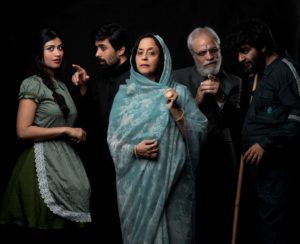Ravindra Tripathi’s Play: Pehla Satyagrahi
Playwright: Ravindra Tripathy
Director: Suresh Sharma
Group: NSD Repertory Company, New Delhi
Language: Hindi
Duration: 1 hr 50 mins
The Play
Pehla Satyagrahi is about the life and struggle of Mohandas Karamchand Gandhi, known as Mahatma Gandhi around the world. This is the story of Mohandas’s journey of truth and non-violence as well as the story of the independence of India. He fought a political war for almost twenty years in South Africa and when he returned to India, he, through his non-violent crusades like Quit India movement, Champaran Satyagraha and Dandi March, made it difficult for the British government to rule India.
Gandhi had said, “My life itself is my message.” What kind of life did the Mahatma lead, what were the challenges he faced, and what were the difficulties he encountered, is what we have attempted to express and showcase through this play. Gandhi’s life is larger than life and his personality quite dramatic. He was a walking and fasting saint-politician. He was spiritual and religious. And his death too was dramatic.
Director’s Notes
While working on a production for the 150th birth anniversary of Mohandas Karamchand Gandhi, I thought of a play which brought to light incidents from his life about which we have often heard but haven’t seen being presented earlier, and the younger generation of our country doesn’t know about.
Ravindra Tripathy and I discussed this project. What finally emerged was a narration of the story through Sonia Schlesin, Mahadev Desai, Pyare Lal, Colin Bach and Joseph K. Dock. The first three were associated with Gandhiji as his assistants, Joseph wrote Gandhiji’s first biography, and Hermann Kallenbach was a very close friend.
I have to confess that one of the scenes in this play is fictitious (the creative liberty we are allowed to have). It is in the end where Gandhiji is interviewed by Gandhi and answers some unanswered questions to himself; the questions which till date are buried deep somewhere under the rubble of history.
The play is the story of the making of Mahatma from Gandhi. It isn’t just history but also today’s voice and necessity of being ‘Swadeshi’ and ‘human’.
The Director
Suresh Sharma did PG diploma with specialization in Acting from National School of Drama in 1985.
In 1987-88 he established the only non-government repertory in the district of Mandi (Himachal Pradesh). From 1996-98 he worked as the Artistic Director of Sri Ram Centre for Performing Arts, Delhi. In 1998 he established the first non-government fully residential Theatre Academy in Mandi, Himachal Pradesh. Mr. Sharma has been felicitated by Sahitya Kala Parishad. Sangeet Natak Academy awarded Mohana, a play written and directed by him, under the Young Director’s Scheme.
Playwright
Ravindra Tripathy is a senior print and TV journalist, cultural critic, playwright, satirist, documentary film-maker, columnist and editor. Tripathy has directed two documentary films and scripted a popular news-satire show Pol-Khol for Star News and ABP News. He is currently associated with Swaraj TV as consultant. He was awarded Sahityakar Samman by Hindi Akademi, Delhi in 2001.
The Group
Established in 1964 with just four members, the Repertory Company of NSD is the regular performing wing of the school. It was set up with the dual purposes of establishing professional theatre on one hand and continuing with regular experimental work on the other. Over the years it has produced a variety of plays ranging from stylized musicals to realistic contemporary Indian drama to translations and adaptations of foreign plays. In addition, several eminent persons of national and international repute have worked with the Company, and it has performed over one hundred and eighty one plays by ninety-eight playwrights and has worked with ninety directors. Quite a few of its actors have emerged as celebrities in theatre, cinema and television. The Company has toured extensively in India and abroad.
Cast & Credits
Gandhi-1 Shanawaz Khan
Gandhi-2 Raju Roy
Mahadev Deep Kumar
Pyare Lal Parag Baruah
Sonia Schlesin Aparna Menon
Meer Alam Rahul Kumar
Attendant/Duda Bhai/ Muslim Sikandra Kumar
Train Officer, Kallenbach Shubham Pareek
Mr. Duke Jitu Rabha
Rajkumar Shukla Ashutosh Banerjee
Aabha Ben/ Dani Ben Suman Purty
Manu Ben Anamika Sagar
Sushila Ben Sakshi Sharma
Kasutrba Gandhi Shruti Mishra
Brij Kishore Vishveshvar M. Gondhali
Multi-Character (Female) Sampa Mandal
Multi-Character (Male) Naveen Singh Thakur
Chorus Sampa Mandal, Sikandra Kumar, Aparna Menon, Rahul Kumar,
Sakshi Sharma, Shubham Pareek, Ashutosh Banerjee, Anamika Sagar,
Virendra Singh, Snehalata S. Tagde, Suman Purty, Manish Dubey,
Vishveshvar M. Gondhali, Jitu Rabha, Palak Jasrotia
Set Design Rajesh Bahl
Set Execution Ram Pratap, Manoj Kumar, Brijesh Sharma
Light Design & Operation Govind Singh Yadav
Assistance Md. Suleman, Pradeep Aggarwal
Costume Design C.S. Bhatia
Costume Coordinator Sampa Mandal, Anamika Sagar
Sound Operation Mukesh Kumar
Sound Design Rajesh Singh
Properties In-charge Moti Lal Khare
Video Design Sourav Poddar
Music Kajal Ghosh
Tabla Om Prakash
Harmonium Naveen Singh Thakur
Key Board Kishore Kumar Malhotra
Flute Anurag Sharma
Sitar Matluf Husain
Tabla, Percussion Pankaj Banai
Dholak Sanjeev Kumar
Make-up Sikandra Kumar, Shruti Mishra
Assistance All Repertory Artists
Stage Manager Govind Singh Yadav
Production Coordinator Sukumar Tudu
Special Thanks for
Dance Choreography Bharat Sharma
Associate Director Pravin Kumar Gunjan
Playwright Ravindra Tripathy
Design & Direction Suresh Sharma
Contacts
NSD Repertory Company
Bahawalpur House
Bhagwandas Road
New Delhi – 110 001
Ph: 011 23383420
W: www.nsd.gov.in
